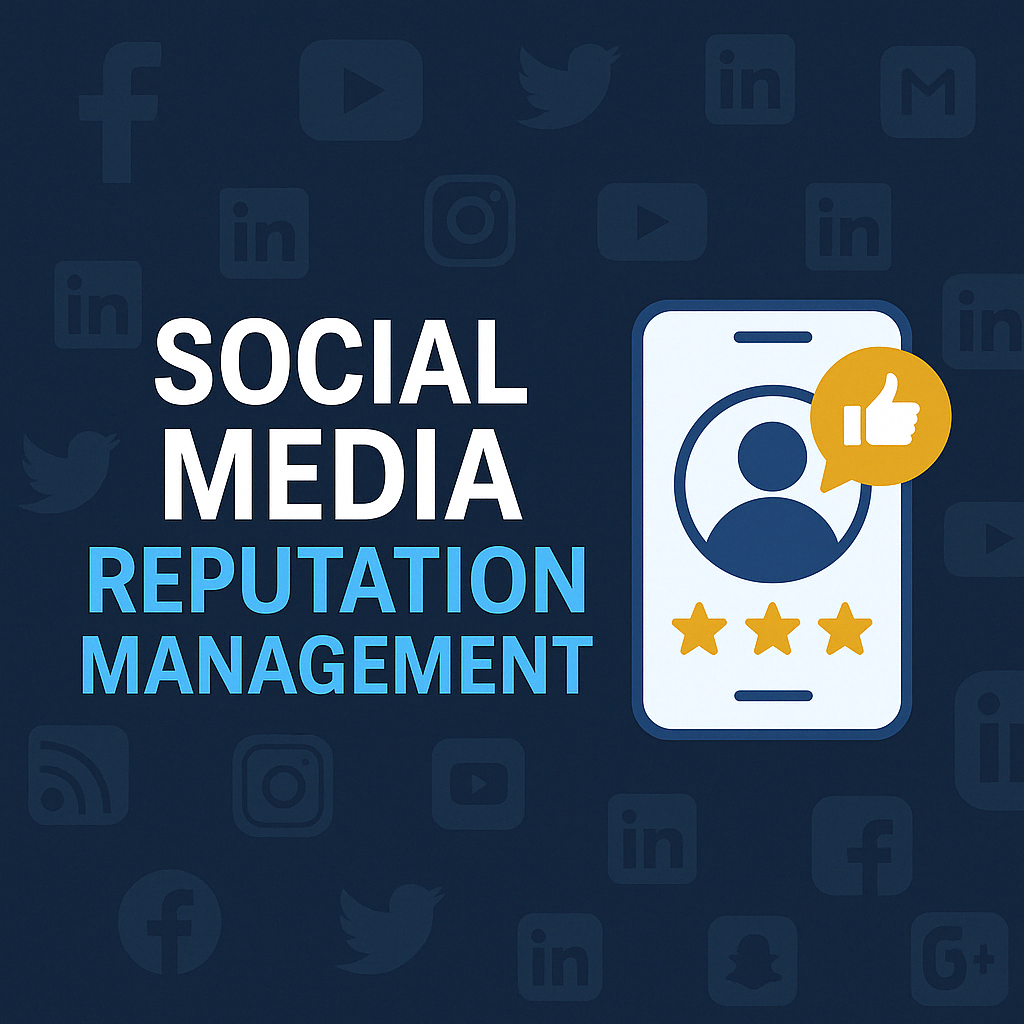Estimated reading time: 5 minutes
Social media is a powerful tool for shaping public perception. Whether you’re a brand, a public figure, or an individual, how you appear across platforms like Facebook, Instagram, LinkedIn, TikTok, Twitter (X), and YouTube plays a critical role in your overall credibility and success. This guide unpacks proven strategies to help you protect, repair, and grow your social presence.
Table Of Content
Why Social Media Reputation Matters
Public perception online is fast-moving and often unforgiving. Social media enables content to spread rapidly, and this can either elevate your brand or devastate your image. Reputation management in social media isn’t just about damage control—it’s a proactive strategy that enhances trust, builds customer loyalty, and attracts opportunities.
Risks of Ignoring Your Social Presence:
- Viral backlash or cancel culture incidents
- Misinterpreted posts resurfacing from years ago
- Negative reviews damaging business credibility
- Identity theft or impersonation accounts
- Loss of job offers or business partnerships
Core Pillars of Social Media Reputation Management
1. Profile Optimization
Start with your bio, photos, and links. Ensure your branding is consistent across platforms and that your content aligns with your values and goals.
Checklist for a Reputation-Safe Profile:
- Professional headshot or logo
- Clear, concise bio free of slang or risky language
- Secure links to business websites or portfolios
- Public privacy settings appropriate to your goals
2. Content Auditing and Cleanup
Use tools like Jumbo Privacy or manual audits to remove old posts that might be offensive, controversial, or irrelevant. Old tweets, memes, or jokes can resurface and cause harm.
Tips:
- Search your name and usernames using Google and social platforms
- Delete or hide embarrassing photos, political posts, or angry rants
- Update outdated information and broken links
3. Monitor Mentions and Engagement
Set up Google Alerts and social listening tools like Mention, Brand24, or Hootsuite. Monitor mentions of your name, hashtags, and keywords tied to your identity.
Respond professionally to comments—especially criticism. Silence can be interpreted as guilt, while well-crafted replies show accountability and leadership.
Reputation Management Tactics for Businesses
For brands, social media is a front-line reputation battlefield. Here’s how to take control:
1. Crisis Management Plan
Create a pre-written playbook that includes:
- Escalation contacts (legal, PR, C-suite)
- Sample public responses
- Password recovery protocols
2. Review Management
Monitor platforms like Facebook, Yelp, and Google for negative reviews. Respond promptly and courteously. Never argue online. Instead:
- Acknowledge the issue
- Express empathy
- Offer a private resolution path
3. Branded Content Strategy
Consistent value-driven content builds trust. Use:
- Behind-the-scenes content
- Customer testimonials
- Thought leadership posts
- Educational reels and videos
4. Social SEO
Hashtags, bios, and post captions should use keywords relevant to your niche. Tag industry partners and use platform-native features like Instagram alt text or LinkedIn articles.
How to Recover from a Social Media Crisis
Step 1: Pause and Assess
Do not react impulsively. Document everything and screenshot key interactions.
Step 2: Remove Harmful Content
Use takedown procedures on each platform or contact a professional. Tools like Google’s content removal form can help.
Step 3: Communicate Transparently
If warranted, issue a brief and sincere statement. Avoid defensive language. Apologize if necessary.
Step 4: Suppress and Rebuild
- Push positive content
- Partner with media outlets for new stories
- Repurpose old content to refresh your narrative
Social Media Reputation and Legal Protection
When defamation, impersonation, or content leaks occur, you may have legal recourse.
Common Legal Remedies:
- Cease and desist letters
- DMCA takedown notices
- Defamation lawsuits
- Right to be forgotten (EU residents)
Explore legal strategies for reputation repair and consult professionals like Defamation Defenders who specialize in reputation-related legal actions.
Social Media Tools for Reputation Management
Top Tools to Consider:
- BrandYourself – Clean up Google results
- Hootsuite – Cross-platform monitoring and scheduling
- BuzzSumo – Identify trending content and sentiment
- Canva – Create branded graphics and posts
- Mention – Real-time alerting system for your name or brand
Defamation Defenders Social Media Services
We provide:
- Full-service social media audits
- Content clean-up and suppression
- Crisis response planning
- Review and feedback monitoring
- SEO-driven social campaigns
📞 Start your consultation today to secure your social presence.
Case Study: Influencer Reputation Rebuild
An influencer in the fitness niche was accused of misleading endorsements. Viral backlash led to lost sponsors and hate comments.
Defamation Defenders Actions:
- Removed defamatory YouTube content
- Issued PR statements through reputable media
- Created positive blogs and SEO content
Outcome:
- Google search page cleaned in 3 months
- Partnerships reinstated
- 200% follower growth after recovery
Pro Tips for Reputation-Safe Posting
- Avoid posting when emotional
- Separate personal and professional accounts
- Think before resharing controversial opinions
- Use a review team for business content
- Monitor employee and brand ambassador behavior
Future-Proof Your Social Identity
As AI deepfakes and impersonation accounts rise, proactive security is essential.
Must-Dos:
- Verify accounts with platforms
- Turn on two-factor authentication
- Trademark brand and usernames where possible
- Regularly review privacy and data settings
FAQ
Start with reporting tools on each platform. If it doesn’t work, contact a reputation management company or legal counsel.
This could qualify as defamation. Document everything, report it, and explore takedown or legal options.
Yes. Many employers and clients check social media history. Regular audits help prevent reputational risks.
Yes, with professionalism. Ignoring complaints may make things worse. Responding shows accountability.
Use consistent names, post frequently, use keywords, link to profiles from your site, and earn backlinks.
Related Contents:
Works Cited (MLA Format):
- Cornell Law School. “Defamation.” https://www.law.cornell.edu/wex/defamation
- Google. “Remove Outdated Content.” https://support.google.com/websearch/troubleshooter/3111061
- Facebook. “Privacy and Safety Tools.” https://www.facebook.com/help/325807937506242/
- Hootsuite. “Social Media Monitoring.” https://www.hootsuite.com/
- Canva. “Create Social Media Graphics.” https://www.canva.com/create/social-media/
- Mention. “Real-time Media Monitoring.” https://mention.com/en/



